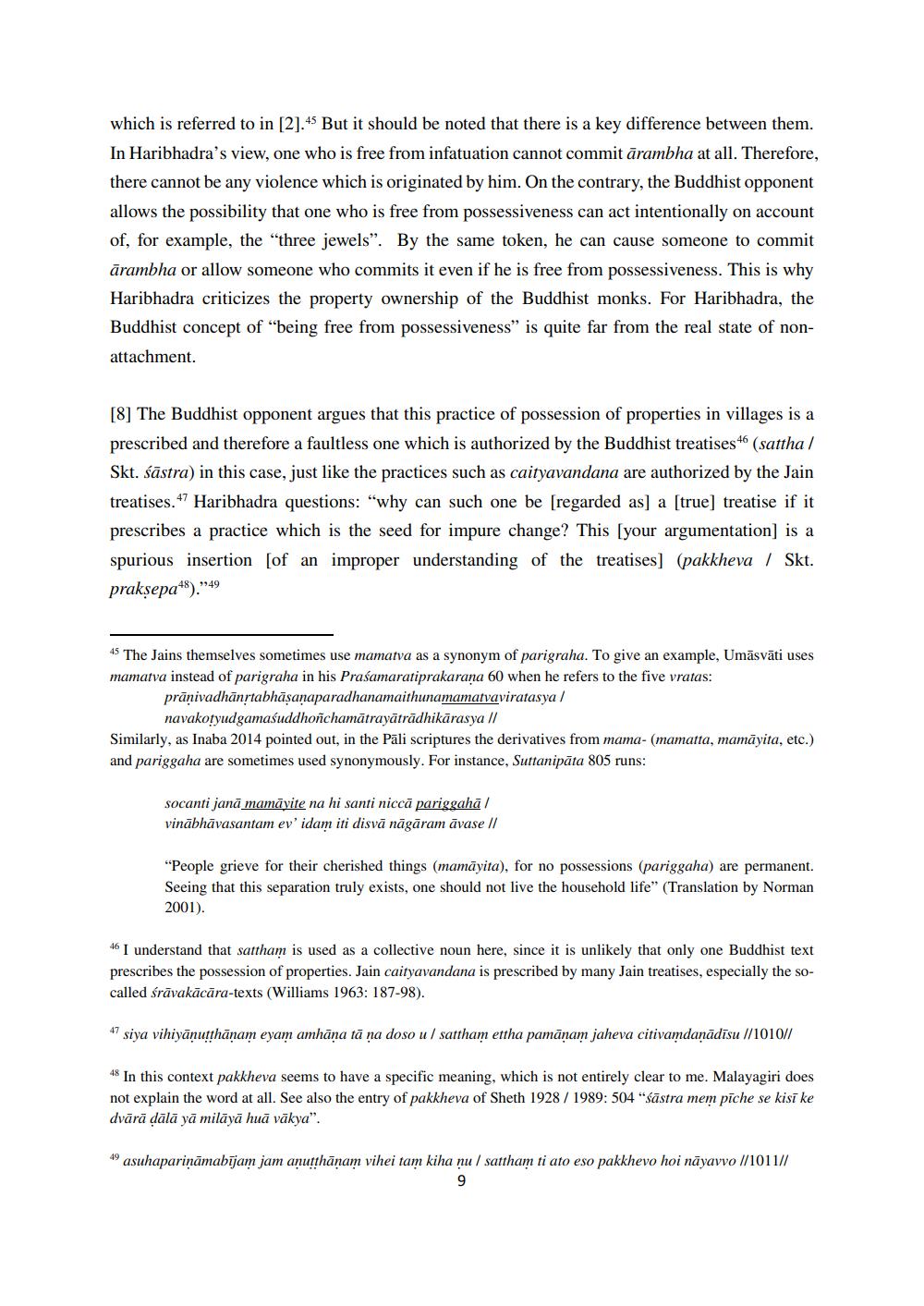________________
which is referred to in [2].45 But it should be noted that there is a key difference between them. In Haribhadra's view, one who is free from infatuation cannot commit ārambha at all. Therefore, there cannot be any violence which is originated by him. On the contrary, the Buddhist opponent allows the possibility that one who is free from possessiveness can act intentionally on account of, for example, the "three jewels". By the same token, he can cause someone to commit ārambha or allow someone who commits it even if he is free from possessiveness. This is why Haribhadra criticizes the property ownership of the Buddhist monks. For Haribhadra, the Buddhist concept of "being free from possessiveness" is quite far from the real state of non
attachment.
[8] The Buddhist opponent argues that this practice of possession of properties in villages is a prescribed and therefore a faultless one which is authorized by the Buddhist treatises 46 (sattha/ Skt. śāstra) in this case, just like the practices such as caityavandana are authorized by the Jain treatises. 4? Haribhadra questions: "why can such one be [regarded as] a [true) treatise if it prescribes a practice which is the seed for impure change? This [your argumentation) is a spurious insertion [of an improper understanding of the treatises] (pakkheva / Skt. praksepa+8)."49
45 The Jains themselves sometimes use mamatva as a synonym of parigraha. To give an example, Umāsvāti uses mamatva instead of parigraha in his Prasamaratiprakarana 60 when he refers to the five vratas:
prānivadhānrtabhāşanaparadhanamaithunamamatvaviratasya /
navakotyud gamasuddhonchamātrayātrādhikārasya // Similarly, as Inaba 2014 pointed out in the Pāli scriptures the derivatives from mama-(mamatta, mamāyita, etc.) and pariggaha are sometimes used synonymously. For instance, Suttanipāta 805 runs:
socanti jană mamăvite na hi santi niccā pariggahā / vinābhāvasantam ev'idam iti disvā nāgāram āvase //
"People grieve for their cherished things (mamāyita), for no possessions (pariggaha) are permanent. Seeing that this separation truly exists, one should not live the household life" (Translation by Norman 2001).
46 I understand that sattham is used as a collective noun here, since it is unlikely that only one Buddhist text prescribes the possession of properties. Jain caityavandana is prescribed by many Jain treatises, especially the socalled śrāvakācāra-texts (Williams 1963: 187-98).
47 siya vihiyānutthānam eyam amhāņa tā na doso u/ sattham ettha pamānam jaheva citivamdanādīsu //1010/1
48 In this context pakkheva seems to have a specific meaning, which is not entirely clear to me. Malayagiri does not explain the word at all. See also the entry of pakkheva of Sheth 1928 / 1989: 504 "Šāstra mem piche se kisi ke dvārā dālā yā milāyā huā vākya".
49 asuhaparināmabījam jam anutthānam vihei tam kiha nu/ sattham ti ato eso pakkhevo hoi nāyavvo //1011//




